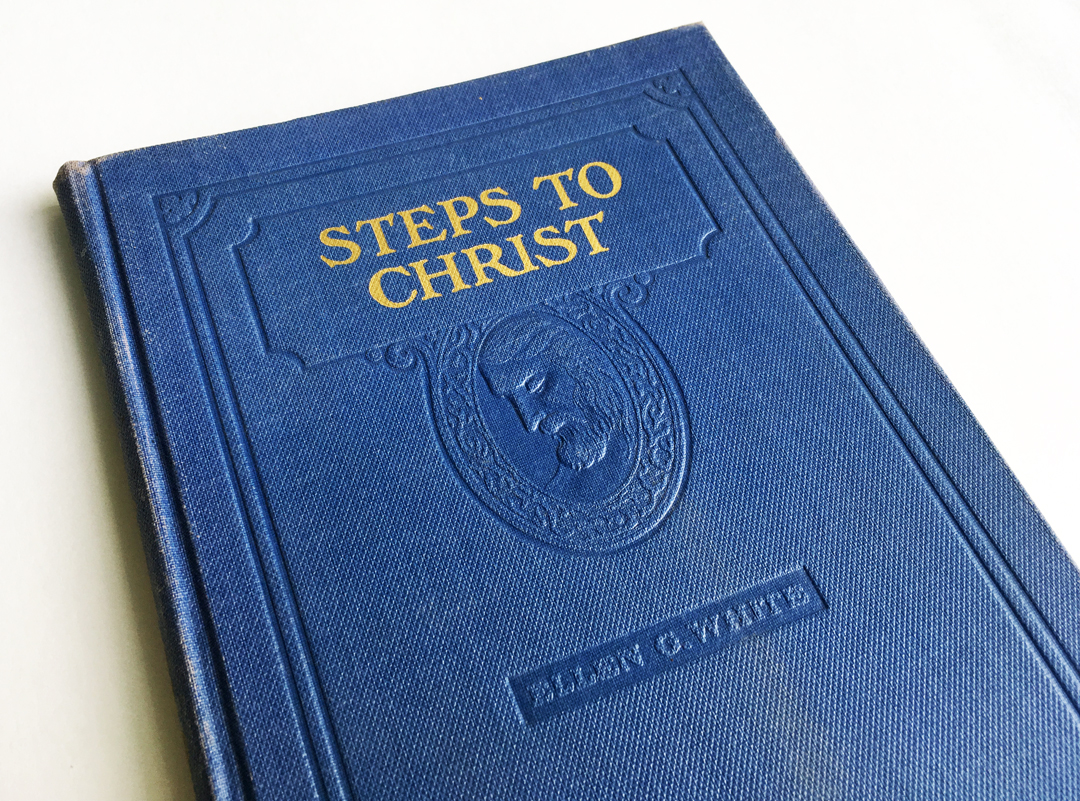By Colleen Tinker
The Adventist News Network has released a news story that the White Estate is celebrating the 125th anniversary of the 1892 publication of Ellen White’s famed Steps to Christ, one of Adventism’s favorite of her books. It has been in the public domain for many years, so many independent Adventist publishers have reproduced it and distributed it to local congregations and individuals for mass mailings and personal “evangelism” use.
In honor of this landmark birthday of the book, the White Estate is carrying out “an initiative called the global Reading of Steps to Christ…to encourage Seventh-day Adventists worldwide to read and study the short volume.”
The associate director of the White Estate, Chantal Klingbeil, “describes Steps to Christ as a book providing a host of answers to questions still asked today, such as how to deal with doubt, ways to know if you are converted, and understanding the difference between ‘grace’ and ‘the law.’” She also says “she believes many theological problems could be solved if we could all ‘absorb the principles found within Steps to Christ, as its theology remains very central.”
This book is a favorite of Adventists, and many members memorize passages from it.
Nevertheless, in spite of the fact that the book contains many “almost right” sounding passages, it does not teach the clear gospel. It does not teach the substitutionary death of Christ, His death, and His resurrection as the good news which we must believe. It does not teach the new birth.
Steps to Christ fails to teach the gospel “indicatives”, the facts stated in Scripture that are true of us when we have trusted Christ as our Savior and Lord. Instead, it focuses on the “imperatives”, the commands given in Scripture, especially in the New Testament, that describe the ways a born-again believer will live.
If one puts the imperatives, or commands, before the indicatives—the reality of our position and power and peace and eternal security—that are truths for those who believe, one will become mired in either moralism or legalism. The gospel imperatives are only for those who know Jesus and have been sealed with the Holy Spirit. They are not “steps to Christ” that the spiritually dead can follow to become right with God.
Examples of statements of “another gospel”
For example, the very name of the book, Steps to Christ, denies what Jesus said in John 6:29: “This is the work of God, that you believe in Him whom He has sent.” There are no “steps to Christ”. We come to Him when we believe in Jesus and at that moment we pass from death to life and do not come into judgment (Jn. 5:24).
In the chapter entitled “Repentance” is this revealing quote:
Even one wrong trait of character, one sinful desire, persistently cherished, will eventually neutralize all the power of the gospel…Christ is ready to set us free from sin, but He does not force the will; and if by persistent transgression the will itself is wholly bent on evil, and we do not desire to be set free, if we will not accept His grace, what more can He do? We have destroyed ourselves by our determined rejection of His love (p. 34).
This passage clearly teaches that we are responsible for being saved or lost and that our sin is more powerful than the gospel. Jesus is waiting to free us, but we have hardened wills because we have persistently sinned. Poor Jesus can’t do what we won’t let Him do; we have destroyed ourselves, and He is rendered unable to help us.
The Bible, however, teaches that we are born utterly depraved and dead in sin, by nature children of wrath (Eph. 2:1-3). We are unable to please God, seek God, understand God, or do good. We are completely unable to keep His law or to decide to overcome our sin. Instead of providing a goal for us to achieve, the Law shows us we are sinners and condemned by nature. (Rom. 3:9-20).
We need a Savior who can save us from ourselves, in spite of ourselves. We need a God who,
being rich in mercy, because of His great love with which He loved us, even when we were dead in our transgressions, made us alive together with Christ (by grace you have been saved), and raised us with Him in the heavenly places in Christ Jesus, so that in the ages to come He might show the surpassing riches of His grace in kindness toward us in Christ Jesus. For by grace you have been saved through faith; and that not of yourselves. It is the gift of God; not as a result of works, so that no one may boast. For we are His workmanship, created in Christ Jesus for good works, which God prepared beforehand so that we would walk in them (Eph. 2:4-10).
Moreover, we need a Savior who can keep us saved. We cannot be obedient enough to qualify for staying saved. We need a Savior who knows us even when we are lost and calls us. In fact, Jesus was so clear with the Pharisees that He actually stated that their unbelief was the consequence of their not being His. Here is what He said to them in John 10:26-29:
But you do not believe because you are not of My sheep. My sheep hear My voice, and I know them, and they follow Me; and I give eternal life to them, and they will never perish; and no one will snatch them out of My hand. My Father, who has given them to Me, is greater than all; and no one is able to snatch them out of the Father’s hand.
Our salvation is entirely the work of God, not a product of our obedience. We are not saved or lost on the basis of our strength of will or persistent sin. We are saved or lost purely on the basis of whether or not we believe in Jesus’ finished work, and even our faith is a gift from God.
One last quote from this classic Ellen White book reveals her teaching that our own discipline of our thoughts determines how much we receive of God’s presence. This quote is taken from the chapter entitled “The Privilege of Prayer”, p. 102:
“If we thought and talked more of Jesus, and less of self, we should have far more of His presence.”
Once again, EGW gives an imperative to people completely lacking understanding or experience with the gospel indicatives. God’s presence with the believer does not ebb and flow with our thoughts and speech. When we are sealed with the Holy Spirit when we believe, He is a guarantee of all that is ours in Christ (Eph. 1:13-14). We cannot get more of Him when He indwells us. He gives us Himself. We can learn to trust Him with deeper parts of our own selves as we grow with Him, but it is His Spirit who changes us.
In fact, this promise of our triune God declares that nothing in all creation—and creation includes our own fickle hearts and the spiritual battles and suffering that are part of the Christian life—can ever separate us from Him:
For I am convinced that neither death, nor life, nor angels, nor principalities, nor things present, not things to come, nor powers, nor height, nor depth, nor any other created thing, will be able to separate us from the love of God, which is in Christ Jesus our Lord.
Conclusion
The Adventists News Network quotes an Adventist author saying this about Steps to Christ:
Anyone who has read Steps to Christ knows…profound truths await discovery with each new reading. Every chapter contains gems of hope, comfort or promise that many have committed to memory.
The glaring problem with this summary of the book is that Scripture is overlooked. When we have the eternal, inerrant, sufficient word of God (for which, by the way, a great many people gave their lives in order to make it available to us in our languages), no extra-biblical prophet can possibly offer the spiritual richness and direction which only God can give.
We are “born again not of seed which is perishable but imperishable, that is, through the living and enduring word of God” (1 Pet. 1:23).
No work of man—or of woman—can deliver the truth about ourselves and about God that God’s own word gives us. Steps to Christ is not a book that enriches one’s walk with Jesus. Instead, it confuses and obfuscates the astonishing and clear truth of the gospel. We are saved entirely by the grace of God through the finished work of Jesus’ life, death, and resurrection.
SUPPORT PROCLAMATION!
- June 28–July 4, 2025 - June 25, 2025
- We Got Mail - June 25, 2025
- Abortion In Adventism: Why Seventh-day Adventism Promotes Choice - June 22, 2025


Hi, Colleen. I thought readers might like to know where STEPS TO CHRIST teaches the new birth. It was in the original first chapter entitled, “The Sinner’s Need of Christ.”*
SC 18.2 The Saviour said, “Except a man be born from above,” unless he shall receive a new heart, new desires, purposes, and motives, leading to a new life, “he cannot see the kingdom of God.” John 3:3, margin. The idea that it is necessary only to develop the good that exists in man by nature, is a fatal deception. “The natural man receiveth not the things of the Spirit of God: for they are foolishness unto him: neither can he know them, because they are spiritually discerned.” “Marvel not that I said unto thee, Ye must be born again.” 1 Corinthians 2:14; John 3:7. Of Christ it is written, “In Him was life; and the life was the light of men”—the only “name under heaven given among men, whereby we must be saved.” John 1:4; Acts 4:12. (SC 18, 19)
* Since the addition of the chapter, “God’s Love for Man,” in 1893, the statement is now in chapter 2.